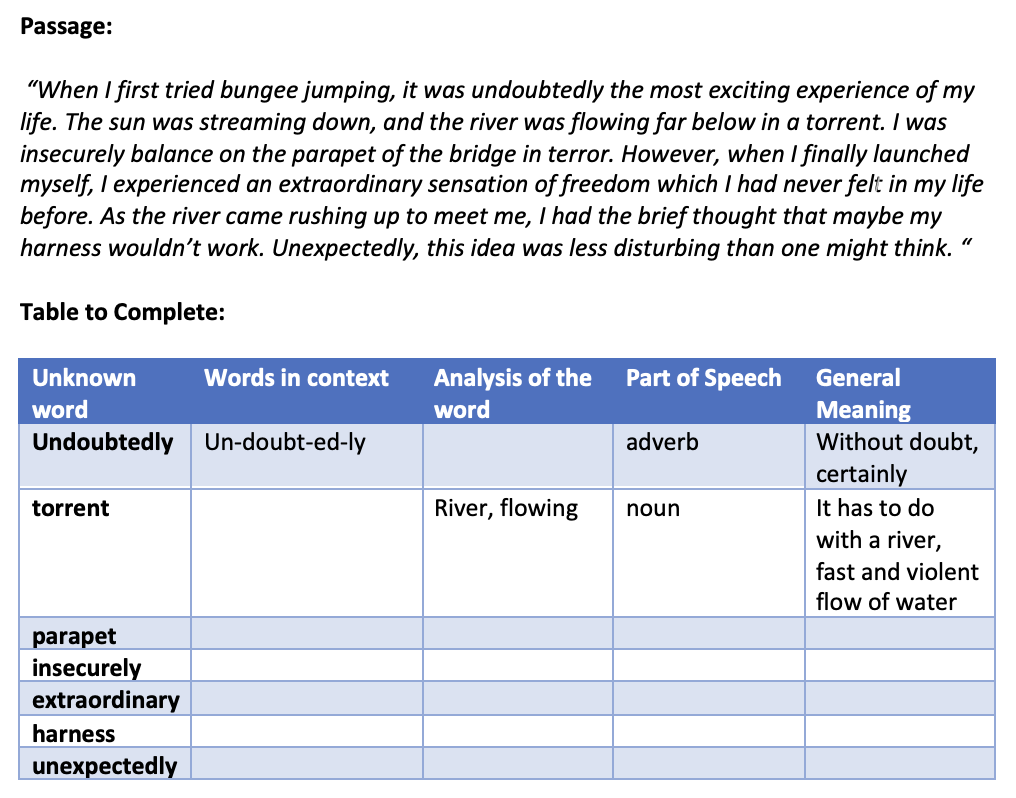How to Figure Out The Meaning of Unknown Words
Disclaimer: The views and opinions expressed in this article are solely those of the author and are not endorsed by any educational institutions or official bodies. This article is intended for informational purposes and should not be considered as professional advice. While every effort has been made to ensure the accuracy of the information provided, Bing's Academy makes no guarantees or warranties, express or implied, about the completeness, accuracy, or reliability of this article. Please use your own judgment when interpreting and using this information.
If you want to find out the meaning of words you don’t know in reading comprehension texts, how do we do it? There are a few different strategies we can employ. Beyond the long-term strategy of naturally growing your vocabulary, I’ll go through a method that may give you a clue to words you don’t know the meaning of.
For reading comprehension questions, you must read a text, understand, and answer it accordingly. The trouble here is that I hear from parents and students that they just don’t know the meaning of the words, so they find it difficult to understand it leading to incorrect answers. The technique won’t work effectively if you don’t know several words in a sentence or paragraph so keep that into consideration. It is always better to grow your vocabulary, but this strategy can be used quite effectively in test environments like in high school or for the OC and Selective exam.
There are four things you need to do that will assist you.
1. Always look for clues in the context
This means looking at the word itself as well as the words before and after it. This is the easiest way to infer the meaning of a word you don’t know. It may be words associated to the meaning and that can give you important clues to know what it means. For instance, the word ‘torrent’ can be a tricky word for some students but if it is placed in a sentence with the word river and flowing, we know it has something to do with it.
2. Analyse the word
This is the part where you break it down in terms of syllables and analyse it in its parts. The root, ending, prefix and suffix of the word. There already may be a root word which is a fancy way of a word that uses a shortened word as its base. An example is a word ‘insecurely’. The root word is secure which is to do with support and confidence. When we tie this in with the prefix -in. This makes the meaning in this example, the opposite showing a lack of support and confidence.
3. Part of speech
If the above hasn’t helped you enough yet, you can then see the part of the speech. Is it a noun, adverb, adjective or something else? This can shape the meaning and limit the scope of your guess making it more accurate. For example, if a word has a suffix with – ly it is generally an adverb even though it can be an adjective. Although chances are it is not a noun so it can’t be something you can touch.
4. General topic it is related to
Depending on where this word lies in a sentence or the paragraph, you can tell the general topic and what it may mean approximately. If it is in the middle of a sentence, the words before it can make it seem like they can be emphasising a point. The words at the end of the sentence can then reinforce your guess. I would not suggest students know the dictionary or textbook definition of any word. If you know the gist of it, I think that’s fine because we want to be practical with it and be able to apply it. Don’t be caught up with spending too long in knowing and wording it in a particular way otherwise you won’t even have time to answer the questions.
In conclusion, this is one effective strategy that we teach in our lessons. It is not always this linear and the exact way we teach this is not exactly the same but the gist is still there. In saying that though, this will not work if you don’t know many words in a text and it will never be as good as just knowing the meaning of the word outright with having a deeper vocabulary.
Have any questions or want to know how we help students improve?Connect with us here.

